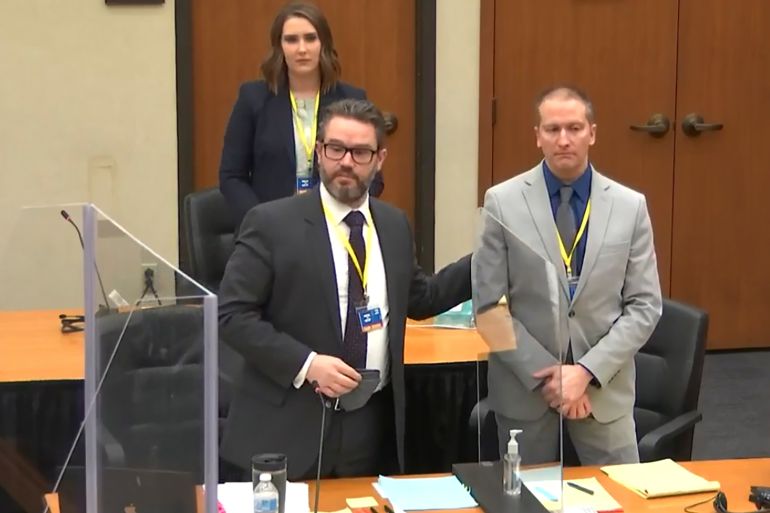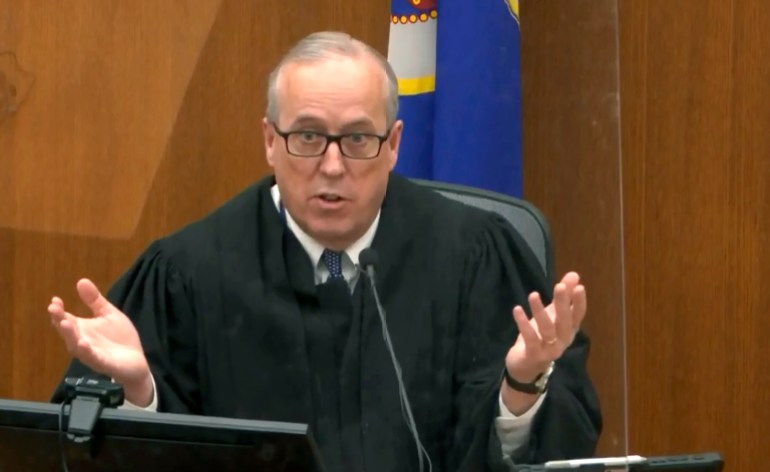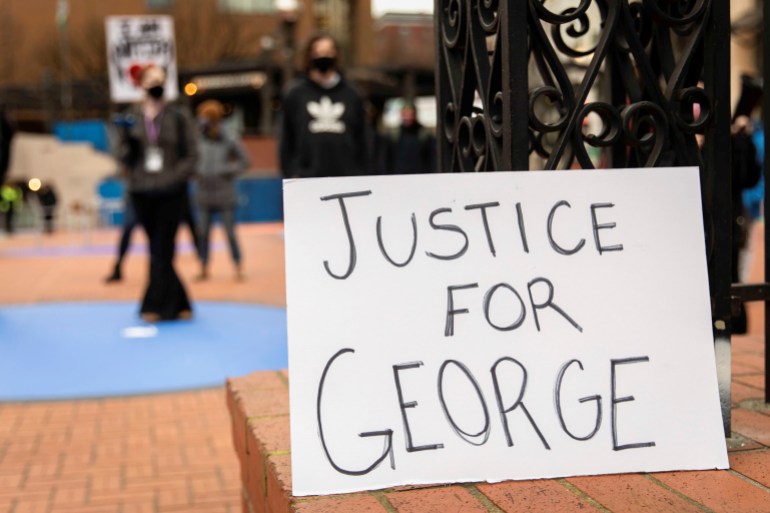Two Chauvin jurors dropped after record $27m Floyd settlement
Record settlement causes two jurors to reconsider their impartiality in trial of officer accused of killing George Floyd.

A judge has dismissed two jurors who had been seated for the trial of a former Minneapolis police officer accused in George Floyd’s death over concerns they had been tainted by the city’s announcement of a record $27m settlement with Floyd’s family.
Hennepin County Judge Peter Cahill recalled seven jurors who were seated before the settlement was announced last week and questioned each about what they knew of the settlement and whether it would affect their ability to serve.
Keep reading
list of 4 itemsThird-degree murder charge reinstated in George Floyd murder case
George Floyd settlement is largest yet for police killing
Outcry as Charlie Hebdo depicts Meghan Markle as George Floyd
Eric Nelson, the lawyer for accused former officer Derek Chauvin, requested the recall.
Chauvin is charged with murder and manslaughter in the May 25 death of Floyd, a Black man who was declared dead after Chauvin, who is white, pressed his knee against his neck for about nine minutes.
The dismissal of only two jurors suggested the effect of the settlement on the jury pool was less than feared, likely reducing the chance of Cahill granting a defence request to delay the trial.

Cahill was careful to ask jurors if they had heard the news of the settlement without giving details, saying only that there had been “extensive media coverage about developments in a civil suit between the city of Minneapolis and the family of George Floyd” and asking if they were exposed to it.
The first dismissed juror, a white man in his 30s, said he had heard about the settlement. “I think it will be hard to be impartial,” he said.
“That sticker price obviously shocked me,” the second juror dismissed said. The Hispanic man in his 20s said he thought he could set the news aside, but was not sure, and after a long pause, Cahill dismissed him.
Cahill retained five other jurors, including a Black man in his 30s who told Cahill he heard about the settlement on the radio on Friday evening but could put it aside and decide the case only on the evidence presented in the courtroom.
“It hasn’t affected me at all because I don’t know the details,” he said.
Jury selection had been proceeding faster than expected, with opening statements tentatively expected on March 29 at the earliest, but the two dismissals could imperil that start date. Nine people had been selected for the jury before Wednesday’s dismissals; 14 are needed.

Nelson called the timing of the announcement in the middle of jury selection “profoundly disturbing” and “not fair”.
Seven jurors remain, including four men and three women. Four are white, one is multiracial and two are Black, and their ages range from 20s to 50s. Fourteen people, including two alternates, are needed.
The judge said he will rule on Friday on Nelson’s request to delay or move the trial and another to admit evidence of Floyd’s 2019 arrest in Minneapolis, during which several opioid pills and cocaine were found.
Prosecutor Matthew Frank argued that evidence from the 2019 arrest was prejudicial and an attempt to smear Floyd’s character.
Cahill previously rejected that request but said he would reconsider after Nelson argued that new evidence makes it admissible: Drugs were found in December that year during a second search of the car Floyd was in and were found in a January 2020 search of the squad car into which the four officers attempted to put Floyd.
Corporations have donated or pledged $8 billion to racial equity causes since the police killing of George Floyd, far more than foundations and philanthropists. The trend signals a shift for companies, but experts say it's difficult to follow the money. https://t.co/gLIExjJBwq
— The Associated Press (@AP) March 17, 2021
Floyd’s death, captured on a widely seen bystander video, set off weeks of sometimes-violent protests across the country and led to a national reckoning on racial justice.
The Black Lives Matter movement continued protesting for months, highlighting the deaths of other people of colour while in police custody.
The movement has sparked calls for legislative reform over policing and a push for racial equity, as the US continues its reckoning with racial disparities.